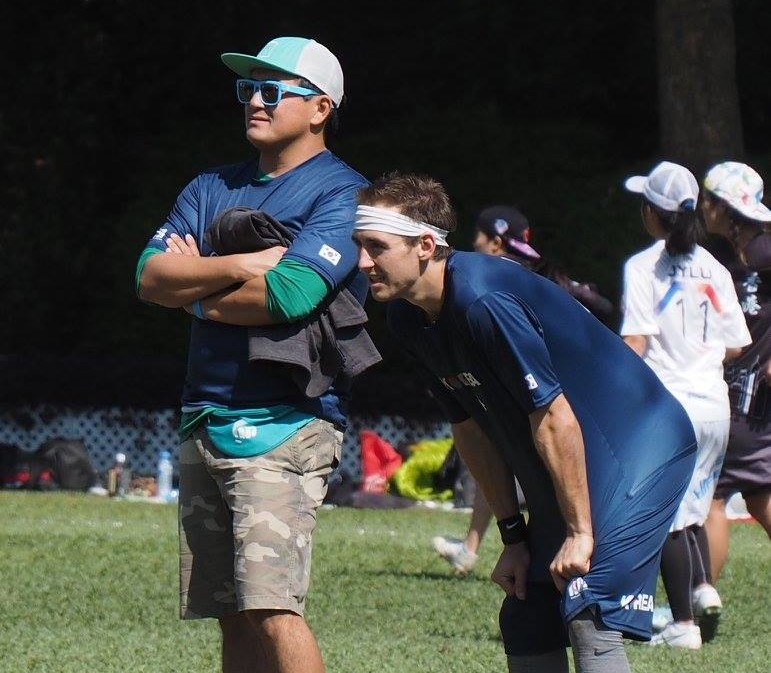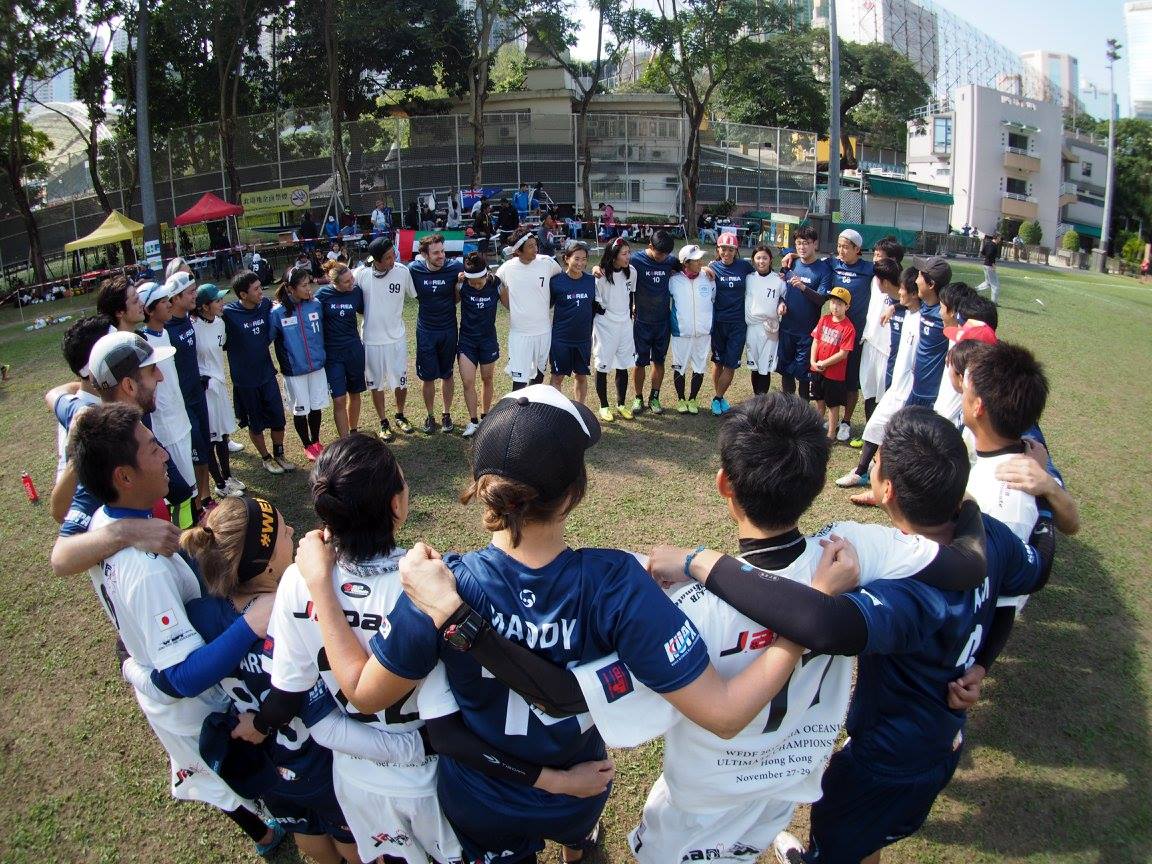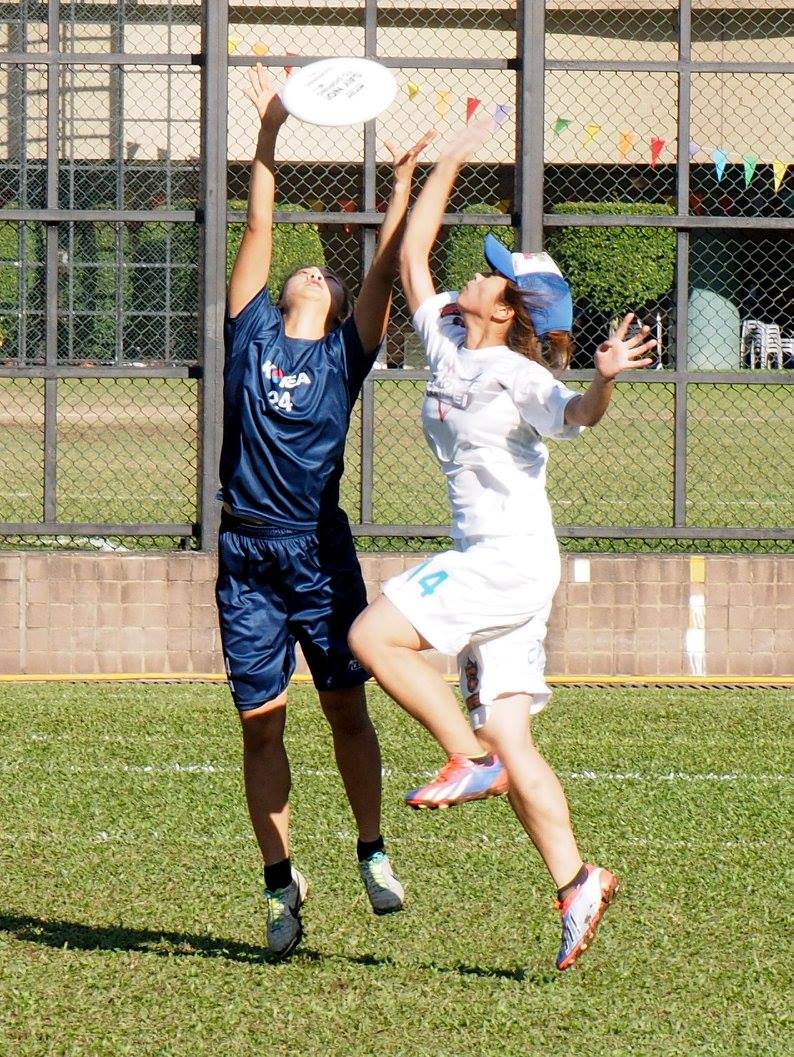There are a few big themes that dominate who I am. Two of them are being Korean-American and playing/coaching ultimate.
My first foray into ultimate was at my Korean church’s summer camp in NYC. The best teams back then were the teams at New York’s magnet public schools Bronx High School of Science, Stuyvesant High School and Brooklyn Technical High School. A large percentage of those players were Korean-American immigrants and to me ultimate to Koreans in NYC was akin to football to high schoolers in Texas – they just seemed to go together. Imagine my surprise when I stepped onto my first practice at Rutgers University to find that I was one of two Asians on the team and that everyone seemed bigger and faster than me. As my ultimate journey continued, I quickly stopped associating ultimate with Koreans.
Then there was Potlatch. I glanced at the team list in mid-2000 and got excited when I saw a team’s description as hailing from Korea. I envisioned myself playing with this team in the future but I was confused when I found out the team was composed of mostly white people. They explained how they all had taught English in Korea as ex-pats and had moved back to the states and wanted to continue to play within their social group. I was glad they were there but I was also disappointed. I hoped to re-live a bit of my high school ultimate days filled with Korean teammates, and this Potlatch squad wasn’t quite that.
In the spring of 2013, I decided to visit Korea for the third time since my family immigrated in 1976. It had been 16 years since my last trip and I was excited to explore Seoul on my own for the first time as an adult. A friend of mine in Seattle connected me with a handful of Korean players and I got a chance to practice, eat and hang out with them. It was a joint practice and there were Korean players and foreign players. Ever since then, I kept in touch and got another chance to meet the Korean ultimate community at the 2015 Jeju Fresh Fourteens tournament in April.
(Side note: Seattle Sockeye’s Will Chen has been quoted as saying the Jeju tournament is one of his favorite tournaments anywhere. He’s right. For about $90 you get two nights of hotel accommodations, beer all weekend, buses to the field and back, all meals all weekend covered, a Friday night registration party and a Saturday all-you-can-eat buffet dinner party. For $90!)
In both trips I was struck by two different observations. The first was the large number of ex-pats who played the game and the small number of Korean nationals that played the game. However there were at least 2 teams at the Jeju tournament comprised mostly of Koreans. The second was that everyone in the community (ex-pat or Korean) was incredibly hungry for more and more ultimate knowledge. Mario O’Brien has told me that Rise Up has done more clinics in Korea than any other country. People there are excited about the game and the sport is gaining popularity among Korean nationals.
I got a chance to talk to leaders of the Korean Ultimate Players Association during the Jeju tournament and there were some informal discussions about coming back to coach a team or a clinic in the future.
When I learned that KUPA was planning to send a mixed team to the 2015 Asia Oceanic Ultimate Championships I got excited and asked them (and the captains) if they would be interested in having me tag along to help in any way needed. I was incredibly grateful and excited when they approved for me to join them as their coach! This was something I dreamed of as an immigrant kid in NYC (although my dream was playing for a Korean national team but you take what you can get) and I enthusiastically booked my travel.
I travelled to Seoul a week before the tournament and helped out at two practices over the weekend. In speaking with captains I soon realized there was some tension on the team tied to language, culture and expectations. Some Koreans were unhappy that most of the practices were in English and it was hard to understand — most of the practices were led by foreigners (only two of the non-Korean citizens on the team spoke fluent Korean). There was also some tension about expected play time as the team was representing Korea at AOUC but the best players for the most part were foreigners.Korean ultimate is now at a really important stage of their growth. The passion and numbers of ex-pats really fueled their leagues and growth up to this point but now the sport has started to take root with Korean citizens. The AOUC tournament was the first time that KUPA had decided to send a national team to an international tournament. There was a Korean team at Lecco, but it was more like a club team filled mostly with ex-pats. There were 21 members of this AOUC team and only 8 were foreigners (7 from the US and 1 from Malaysia). Two of the three captains were Korean citizens.
I thought my role would be to help with strategy and provide tips. I never considered calling lines but I realized that as an outsider it’d be helpful for me to do that. I was okay with playing the role of the “bad guy” after speaking with the captains about what they wanted in terms of sub-calling. If the American captain called lines any perceived slight of Korean playing time would be called into question as playing favorites and if the Korean captains called lines they’d be under intense pressure to play other Korean nationals more. I could be unbiased. That was my hope at least.
Any coach at any level will tell you that calling lines is one of the hardest things to do. However, at AOUC I had the burden of calling lines and thinking about strategy while also trying to delicately balance play time between foreigners and Korean nationals with winning and being competitive. It was one of the hardest coaching tasks I have ever performed and I hoped I did okay.
Korea came into the tournament ranked 5th out of 10 teams. That seeding seemed a little high for most of our team but we proceeded to finish 3rd in our pool and held seed. We defeated United Arab Emirates (how is UAE part of Asian-Oceanic is anyone’s guess) and Chinese Taipei while losing a close game to Hong Kong. We were soundly defeated by Team Japan, the tournaments’ one seed.
On day 2 we found ourselves facing the Philippines in quarters. This team had many members of the same team that played the US All-Stars in Manila a week ago, but we found ourselves holding our own. We ended up losing 11-14 and were knocked out of the championship bracket.
On day 3 we had a 5th/6th place game to determine if we would hold seed against Hong Kong. Although we lost on universe point to take 6th we played incredibly well and the team felt great about how we competed. We watched the finals where the Philippines (after upsetting Japan in semi-finals) faced off against Australia. The Philippines would win that game and we felt even better after giving them such a good game the day before.
I was incredibly proud of this team that was mostly comprised of Korean nationals who had not been playing ultimate that long. In our team huddle after our second loss to Hong Kong, I told them that this tournament was just the foundation. More than our placement or our scores, other countries took notice of Team Korea not just because how we played but how we looked. We were definitely a national team and not a team dominated mostly by foreigners.
The two players that stood out during this tournament were Haeri Kim and Brice Douglas Dixon. Haeri was one of the three captains and was the most dominant woman on the team. She is fast, fearless, can throw dimes and shuts down her opponent. I would take her on Seattle Underground in a heartbeat! Brice was the Callahan nominee from The University of Arizona a few years ago and is teaching English in Korea. He played incredibly well all weekend with his throws, break-marks and lay-outs. He stepped up in our game versus the Philippines and was a huge reason why we competed so well against them!
AOUC 2015 was all about pouring the concrete and Korea needed to use this experience to catapult themselves into the next stage of growth. I told the team that they were all ambassadors now. They had represented their country well and now they needed to go home and tell everyone about their experience to awaken the passions of their fellow citizens.
The next chapter is London in 2016 and Worlds. Keep your eyes open and join me in watching Korea’s rise in the international scene!

![Korea lays out at AOUC. [Noah Markus]](https://skydmagazine.com/wp-content/uploads/2015/12/12291729_1108252532518621_1190609114663217669_o.jpg)







Comments Policy: At Skyd, we value all legitimate contributions to the discussion of ultimate. However, please ensure your input is respectful. Hateful, slanderous, or disrespectful comments will be deleted. For grammatical, factual, and typographic errors, instead of leaving a comment, please e-mail our editors directly at editors [at] skydmagazine.com.